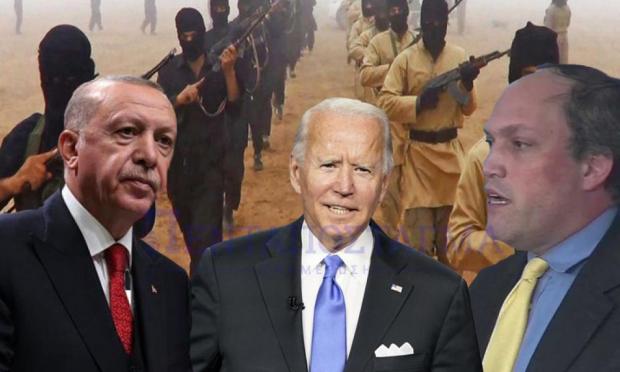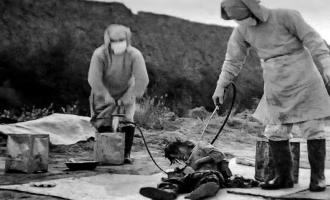"Every dictator wakes up wondering if today could be his last" states Michael Rubin for Turkish President Recep Tayyip Erdogan in an interview with Evangelos D. Kokkinos for pentapostagma.gr.
The respected analyst of American Enterprise Institute (AEI) and former Pentagon official, analyzes what the changes of the political landscape in the USA will bring to US-Turkey relations and the consequences that they will have in the Eastern Mediterranean region.
The Turkey-NATO relationship, the Greek-French alliance and the rapid strengthening of US-Greek relations, as well as the pan-Turkish aspirations of the religiously fanatical Erdogan are some of the issues raised by the American expert.
Erdogan is actively trying to expand Turkish influence in the region and because of Russia's and US's indirect support appears to be succeeding in Syria, Iraq and Armenia. In this context, do you think that the Greco-Turkish conflict might have a similar outcome?
No, Greece is an exception: There has been a bipartisan move to strengthen U.S-Greece ties. The top advisors in the incoming Biden administration are much better versed on the Eastern Mediterranean than was Trump's team. To be blunt--and I say this as a Republican--Biden's team is also less susceptible to Turkey's attempts to bribe them. There doesn't appear to be a senior level equivalent to Michael Flynn, for example
Considering the forthcoming changes in the political scenery in the US, do you think a Biden administration would follow a stricter policy against Erdogan's authoritarianism? What is the most likely move to follow in US politics regarding Turkey?
The natural inclination within Biden's team is to put up with a lot less of Erdogan's nonsense. That said, within Biden's broader camp, there are many who argue that Turkey is too important to lose. This was a view most recently expressed by Michael O'Hanlon and Omer Taspinar in The National Interest, for example.
But, holistically, while Turkey once had great influence in Washington, today it has negative influence:
The Congressional Turkey Caucus is a shadow of its former self and most everyone who works with Turkey is afraid of being tainted by Erdogan and his excesses.
American ambassador in Athens recently stated that there is a place for Turkey in the EastMed project. Keeping in mind that the EastMed is exclusively financed by Israel and the EU, for natural resources in the Israeli and Cypriot EEZ, how can Washington think it is ‘OK’ to suggest this?
The State Department is infused with moral equivalence. Remember how the State Department spokesman referred to the waters off Kastellorizo as "disputed" even though the only party disputing international law was Turkey? When diplomats say such nonsense, it should not be tolerated but rather pushed back upon hard. The correct answer is that countries like Turkey can only be part of an economic community when they abide by the law, stop occupying others' territory, forfeit their claims to others' resources, and separate politics from business inside their own country.
Erdogan is known to use Islamist mercenaries as a "human shield" and many EU leaders accused him of stimulating the recent attacks in France and Austria. Even in Nagorno-Karabakh, Turkey's intervention made the Armenians characterize the conflict as a "Holy War". Is Greece and/or other EastMed countries a potential target for turkish-backed islamic extremism?
Yes. Simply put, the problem with Erdogan isn't just diplomatic, it's ideological. And while some analysts say that Erdogan isn't Turkey and that Turkey will cease to be a problem once Erdogan is gone, the fact of the matter is 30 million Turks have been educated under Erdogan and he has remained in power long enough to shape the military in its entirety.
Turkey today is to radical Islamism what Saudi Arabia was in the 20th century.
Are Greece and Cyprus current standing sufficient to keep Turkey in line? What should be the next step in your opinion?
Greece and Cyprus are acting properly. While diplomats and the European Union are naturally risk averse, the evidence shows that Erdogan backs down when countries stand up to him. Remember how quickly he folded after the US imposed sanctions for the detention of Pastor Andrew Brunson? Or how Erdogan backed down on the Oruc Reis when he realized that other countries would not tolerate his action?
The danger is that when attention moves elsewhere, as with the Oruc Reis, he will try again.
The Erdogan-Macron conflict starts in the Mediterranean and extends through to Africa and even the Middle East. At the same time France have suffered greatly from Islamic terrorism, encouraged in some degree – someone might say - by Turkey. Where do you think this could lead and to what extent, is such behaviour likely to strengthen further the France-Greece alliance?
France may recognize the reality of Turkey, but the problem with the European Union is that for all the talk of unity, there are always countries which are willing to break consensus. Germany, for example, won't take serious action against Turkey because Merkel fears that Erdogan could incite Germany's Turkish population to violence.
The Turkey-NATO relationship has undergone many challenges in recent times. Do you think that under certain conditions Turkey could be banned from the alliance and, would such a development, strengthen the role of Greece in the region?
It should be banned in an idea world, but there is no mechanism in NATO to do so. While in the past France and Greece have stepped away from the organization, they have done so on their own initiative.
What really should happen is a quarantine within NATO where states limit the distribution of classified information to prevent Turkish officers from accessing it.
If Turkey then wants to leave the coalition, fine.
Do you believe that Turkey will play an effective role in the day-after of the Armenia-Azerbaijan conflict? And how much participation could Turkey be allowed to have when not a part of the Minsk group?
No. Turkey's interest is not peace. Rather, Turkey wanted a corridor to Central Asia in order to pursue in pan-Turkic fantasies. Turkey's apologists could say its other actions in Syria, Iraq, Cyprus, or against Greece were motivated by counter-terrorism concerns or economic disputes. But, in the case of Nagorno-Karabakh, it has no such excuse.
It has involved itself purely for reasons of anti-Christian religious animus.
What do you think is the true message behind Pompeo's recent visit to Turkey after his definitive decision to avoid any meeting with the country's political leadership?
I am glad Pompeo made his move. Turkey is not Erdogan, no matter what Erdogan may like to believe. And the United States is not going to stand by while Erdogan pursues a religiously intolerant agenda.
You frequently characterize Erdogan as a dictator in the footsteps of Saddam Houssein and Siad Barre. In the past, scenarios had been heard for the overthrow of Erdogan, there was even a coup attempt in the summer of 2016, and nevertheless he is still here. Do you see that happening sometime soon?
Every democratic leader wakes up every morning knowing when their term ends. Every dictator wakes up wondering if today could be his last.
if the economy gets bad enough and Erdogan can no longer pay off top business elite, who knows what might happen? He may think of himself as a second Ataturk, but he will likely be remembers as a ruler who brought shame and ruin to Turkey.
Is a full scale war possible in the Eastern Mediterranean? Which countries would most likely be actively involved in such a scenario?
I don't think we will see war. Simply put, Turkey is the type of country that likes to talk big, but is not capable of a serious naval fight. Likewise, in Libya, it would take Turkey weeks to get armor, etc., in place whereas the Egyptians can mobilize to their border and beyond in hours.
Turkey is over-committed and like a balloon which is blown up too far, it can easily burst.















